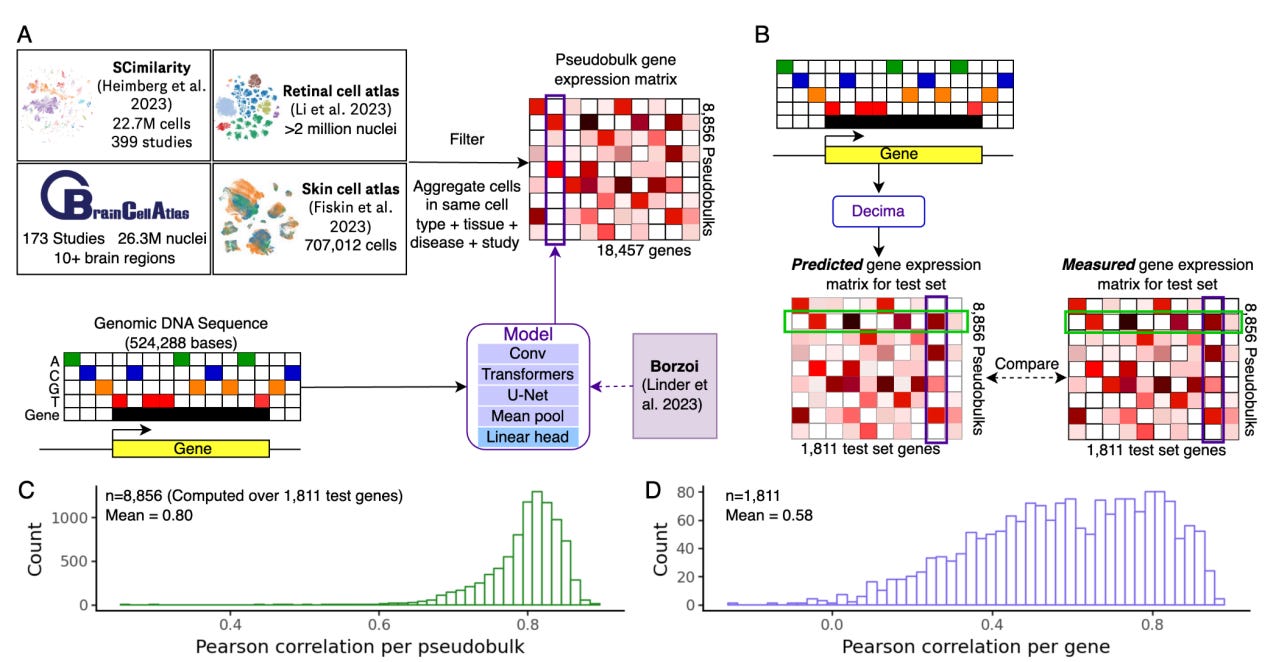📢 Highlights
Genentech’s Decima model sets new benchmark for gene expression predictions
Wave Life Sciences has shown th first successful RNA editing in human
Triana and Pfizer’s $1.5B deal is nuanced, see our breakdown below
Not yet a member of our super awesome slack community of >8000? Join HERE 🤗
👀 In Case You Missed it ..
Decima Outperforms Current Models in Predicting Gene Expression
Released through its recent publication, researchers from Genentech introduced Decima, a machine learning model designed to predict cell-type- and condition-specific gene expression across diverse biological contexts. The model was trained on a massive dataset comprising 22 million cells, spanning 271 tissues and 82 diseases, allowing it to model gene regulatory mechanisms at an unprecedented resolution. One key metric highlighting Decima's superiority is its Pearson correlation of 0.80 when predicting gene expression for 1,811 unseen genes, significantly higher than the correlations of prior models, which generally hover below 0.60. Compared to other models, Decima’s predictive power is enhanced by incorporating a broader range of regulatory elements, such as non-coding genetic variants. It also improves upon other methods like Geneformer and scVI by offering more robust predictions in disease contexts, with 45% greater accuracy in detecting gene expression shifts in ulcerative colitis-derived fibroblasts. This provides deeper insight into disease progression and opens doors to more targeted therapies, especially in chronic diseases like fibrosis and cancer. The potential impact on the industry is vast, particularly for drug discovery and precision medicine. Decima's ability to model regulatory elements could accelerate the design of novel gene therapies targeting regulatory elements with high precision. See the github here.
First successful RNA editing in humans achieved by Wave
Wave Life Sciences announced significant results in their clinical trial showing the first successful RNA editing in humans. This technology was used to precisely edit RNA to address diseases caused by single-point mutations. Their platform demonstrated its potential in patients with Huntington’s disease, significantly reducing the production of toxic mutant proteins. This marks a pivotal moment for RNA-based therapies.
Behind the Deal: Pfizer’s $1.5B Molecular Glue Bet on Triana
Pfizer’s 1.5B collaboration with Triana Biomedicines reflects new momentum around molecular glues (MGs) — these molecules force new protein-protein interactions, opening a new modality for traditionally undruggable targets. Pfizer is late to the party, trailing behind the likes of Merck, Roche, Takeda, and Novo Nordisk. Pfizer aims to tap into MGs for hard-to-drug proteins in various cancers, and now is the optimal time - recent regulatory trends, e.g. the FDA’s accelerated approval pathways, are driving innovative oncotherapeutic developments. Compared to the other main category of targeted protein degradation (TPD), proteolysis targeting chimeras (PROTACs), Pfizer’s investment reflects an increasing trend of massive investments into potential multi-use drugs (similar to GLP-1RAs). Pfizer's investment in Triana ensures a stake in this emerging field, future-proofing their pipeline, before evident clinical breakthroughs that would make access to MGs much more expensive. MGs offer versatility beyond oncology, potentially promoting interactions between 600 human E3 ligases and more than 20,000 potential human target proteins, which new high throughput screening systems can evaluate rapidly.
$120M to Terray Therapeutics to Advance AI-Powered Drug Programs
Terray Therapeutics has doubled its Series A financing to $120 million. The funds will accelerate the company’s AI-powered drug discovery programs, with a focus on oncology and immunology. Terray’s platform integrates AI with high-throughput chemistry to rapidly identify promising drug candidates. Terray's AI capabilities have led to collaborations with Bristol Myers Squibb and Calico, targeting complex diseases. This founding marks a key step in their way to the clinical.
PAMless Base editors show precision in correcting X-CGD mutation
Research highlighted in GEN reveals the success of PAMless base editors in correcting X-linked chronic granulomatous disease (X-CGD) mutations. This novel base-editing technology, developed by a team of researchers, demonstrated efficient correction of the CYBB mutation responsible for the disease. Unlike traditional CRISPR approaches, these base editors do not require PAM sequences, allowing more flexibility and precision in genetic editing. Their findings indicate a high accuracy rate in restoring normal CYBB function.
KdT Ventures raises over $100M for early-stage biotech investments
Austin-based KdT Ventures, a venture capital firm focused on early-stage biotech, has raised more than $100 million to invest in cutting-edge technologies like synthetic biology and precision medicine. This latest funding round will allow KdT Ventures to expand its portfolio of companies targeting revolutionary advancements in healthcare. The firm has already backed 18 startups and looks to double that number in the next two years.
BenevolentAI CEO exits after less than a year in position
One of the best funded Bio AI companies, BenevolentAI, has seen its CEO step down after less than a year in office amidst ongoing restructuring efforts within the company, which specializes in applying AI to drug discovery. BenevolentAI has faced significant challenges, including job cuts and a shift in strategy, but has also made notable achievements such as forging a $594 million partnership with Merck in September 2023. Despite this leadership change, the company remains committed to advancing its AI-driven drug discovery platform.
€300M Returned to Orano by Sanofi following Radioligand Partnership
In a seldom seen transactional phenomenon, Sanofi has returned €300 million to Orano after deciding not to proceed with their radioligand partnership, as per FierceBiotech. This move comes despite promising early-stage data, as Sanofi reevaluates its investment strategy in radiopharmaceuticals. The two companies initially joined forces to explore radioligand therapies for oncology, but Sanofi has opted to shift focus to other therapeutic areas.
Novartis backs Baiyu's cancer candidate with $70M upfront deal
FierceBiotech reports that Novartis has paid $70 million upfront to Baiyu Therapeutics for a small molecule cancer candidate targeting a novel pathway. The deal includes the potential for milestone payments, reaching up to $1.1 billion. Baiyu’s drug candidate is focused on a highly specific oncogenic mutation in several solid tumors, with preclinical studies showing promise in reducing tumor growth. Clinical trials are set to begin in early 2025.
Ocean Biomedical Secures $32M Partnership with Polish Biotech
Polish based Molecure has signed a $32M deal with Pact Ocean Biomedical to advance YKL-40 inhibitors targeting fibrosis and cancer. As reported by FierceBiotech, the collaboration is expected to leverage both companies' expertise to accelerate preclinical and clinical development of these innovative therapies. YKL-40 is associated with poor prognosis in several cancers, making it a high-value target for future treatments.
Seaport Therapeutics closes $225M Series B round for Oncology Pipeline
Boston based Seaport Therapeutics has closed a $225 million oversubscribed Series B financing round to advance its oncology pipeline. The funding will be directed towards the development of multiple immunotherapy programs, including a novel CAR-T cell therapy. Seaport’s lead candidate, designed to treat solid tumors, is expected to enter Phase 1 clinical trials next year.
Angelini secures $360M deal with Cureverse for brain disorder drug
Italian Pharma group Angelini has signed a $360 million biobucks deal with Cureverse for a Phase 1 brain disorder drug targeting neurodegenerative diseases. This partnership gives Angelini exclusive European rights to Cureverse’s investigational therapy. The deal also includes future milestones and royalties, with the companies looking to address a large unmet need in treating brain disorders. Angelini expects Phase 2 results within the next year.
Septerna outlines $157M IPO for GPCR Therapeutics
After advancing its GPCR-targeted therapeutics into the clinic, Septerna is now filing for a $157 million IPO The company’s pipeline focuses on small molecules aimed at treating rare diseases linked to G-protein coupled receptors (GPCRs) involved in many physiological processes. Septerna’s leading asset is expected to show proof-of-concept data next year.
Treeline Biosciences raises $421M for Precision Medicine Pipeline
The secretive Massachuest biotech based outside boston, Treeline Biosciences, has raised $421 million in its latest financing round, bringing its total capital raised to over $1 billion. As reported by the Boston Business Journal, Treeline focuses on precision medicines targeting cancer and other genetically defined diseases. The new funding will accelerate clinical development and expand its therapeutic pipeline.
Sanofi Launches Collaboration for Oncology Research with €296M Investment
University of Texas MD Anderson Cancer Cente has received €296m from Sanofi to develop innovative immuno-oncology treatments for cancer. The partnership aims to accelerate the discovery of therapeutic candidates targeting immune system pathways. Sanofi will leverage MD Anderson's expertise in translational research to identify promising treatments and advance them through preclinical and clinical development. The partnership aligns with Sanofi’s strategy to expand its oncology pipeline and strengthen its position in cancer research.
Exscientia to Receive $15M in Milestone Payments from Sanofi Collaboration
The publicly traded Bio AI company, Exscientia, is set to receive $15 million in milestone payments from Sanofi as part of their ongoing drug discovery collaboration. As reported by Seeking Alpha, the two companies are working together on AI-driven drug discovery programs focused on oncology. Exscientia has successfully advanced several preclinical candidates as part of this partnership.
🗓️ Upcoming BiB Events
See our handy dandy Lu.ma event calendar HERE, please RSVP so folks can plan accordingly!
Bits in Bio Global Learning Mixer – Tuesday, October 22nd
Thank you to Sahil Patel and Shantenu Agarwal for organizing!
New York Lightning Talks – Tuesday, October 22nd
Thank you Matt Stergiou and Pete Chhoy for organizing!
Boston Happy Hour – Thursday, October 24th @ Savills Boston
Thank you to Sphinx Bio and Savills for sponsoring, and Brandon Revelli for organizing!
San Francisco Data Driven Pharma Networking Event – Thursday, October 24th at Merck Event Space
Thank you Ilya Captain for organizing!
Austin Meetup – Tuesday, October 29th @ Radio East
Thanks to Kesav Varanasi and Brendan McKenna for organizing!
📰 Top Community Conversations
@ Curious about the history of the FASTA file format on which Bioinformatics is built? Of course you are! Robert Aboukhalil found a great run down.
🏢 New Job Openings
Notable postings below - over 100 more on our community job board!
(Senior) Research Scientist - Computational Chemistry at Owkin
Founding Engineer at YOUTH HealthTech
Founding Staff Engineer at Axia Medicine
Marketing Lead at Synonym
Senior Accountant at Pathos
Tenure-Track Faculty Position in Bioengineering at Brandeis University
🙋 🙏 Community Asks
Feedback: How is the Newsletter doing? We’re trying different formats/content. In case the hyperlink above didn’t get your attention, maybe a bright orange button will!
Volunteer: Want to get involved with Bits in Bio, meet new members across the community, and learn about the ecosystem? We are looking for volunteers to help us create great content and manage the community.
🙏 Thank you for being a BiB Weekly reader!
We want to deliver what matters most in Bio AI and would love your feedback on how we can do better. Please weigh in as anon here or DM me directly!
— Vince Alessi, BiB Editor in Chief









